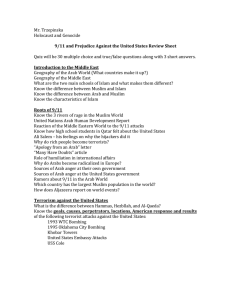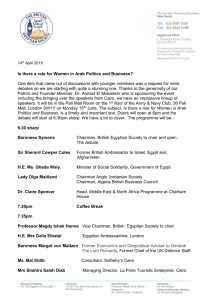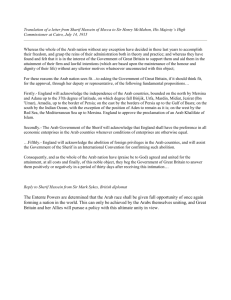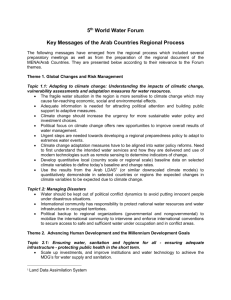Statement for the SFRC by Ambassador Theodore H. Kattouf
advertisement
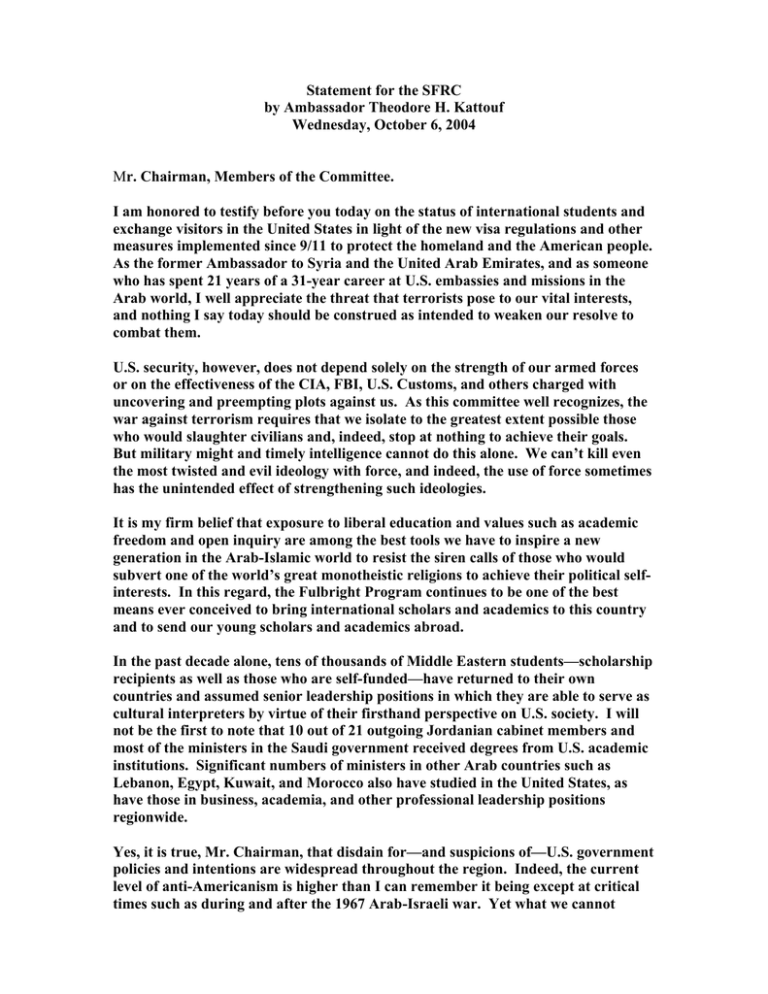
Statement for the SFRC by Ambassador Theodore H. Kattouf Wednesday, October 6, 2004 Mr. Chairman, Members of the Committee. I am honored to testify before you today on the status of international students and exchange visitors in the United States in light of the new visa regulations and other measures implemented since 9/11 to protect the homeland and the American people. As the former Ambassador to Syria and the United Arab Emirates, and as someone who has spent 21 years of a 31-year career at U.S. embassies and missions in the Arab world, I well appreciate the threat that terrorists pose to our vital interests, and nothing I say today should be construed as intended to weaken our resolve to combat them. U.S. security, however, does not depend solely on the strength of our armed forces or on the effectiveness of the CIA, FBI, U.S. Customs, and others charged with uncovering and preempting plots against us. As this committee well recognizes, the war against terrorism requires that we isolate to the greatest extent possible those who would slaughter civilians and, indeed, stop at nothing to achieve their goals. But military might and timely intelligence cannot do this alone. We can’t kill even the most twisted and evil ideology with force, and indeed, the use of force sometimes has the unintended effect of strengthening such ideologies. It is my firm belief that exposure to liberal education and values such as academic freedom and open inquiry are among the best tools we have to inspire a new generation in the Arab-Islamic world to resist the siren calls of those who would subvert one of the world’s great monotheistic religions to achieve their political selfinterests. In this regard, the Fulbright Program continues to be one of the best means ever conceived to bring international scholars and academics to this country and to send our young scholars and academics abroad. In the past decade alone, tens of thousands of Middle Eastern students—scholarship recipients as well as those who are self-funded—have returned to their own countries and assumed senior leadership positions in which they are able to serve as cultural interpreters by virtue of their firsthand perspective on U.S. society. I will not be the first to note that 10 out of 21 outgoing Jordanian cabinet members and most of the ministers in the Saudi government received degrees from U.S. academic institutions. Significant numbers of ministers in other Arab countries such as Lebanon, Egypt, Kuwait, and Morocco also have studied in the United States, as have those in business, academia, and other professional leadership positions regionwide. Yes, it is true, Mr. Chairman, that disdain for—and suspicions of—U.S. government policies and intentions are widespread throughout the region. Indeed, the current level of anti-Americanism is higher than I can remember it being except at critical times such as during and after the 1967 Arab-Israeli war. Yet what we cannot Statement by Theodore Kattouf 2 quantify is how much worse the situation would be for American interests in the region if there were not a cadre of responsible regional leaders who, through their U.S. studies, have gained an appreciation of what is good and decent about America and who know and respect our values. Mr. Chairman, I know you and your committee, along with some other key members of the Senate and the House, strongly support programs and policies that are both consistent with homeland security and keep the welcome mat out for legitimate students who wish to benefit from our educational system and learn more about our way of life. My own organization, AMIDEAST, with 15 offices in 11 Arab countries and territories, is proud that for decades it has received a grant from the State Department that has permitted us to assist hundreds of thousands of Middle Easterners interested in attending U.S. institutions of higher learning. We are no less proud to have been chosen to manage the Fulbright Foreign Student Program for Arab grantees, over 200 of whom are currently studying in this country. My organization has further been involved for many years with various exchange programs, and I want to thank this committee for the support it has given recently to such innovative exchange programs as the Youth Exchange & Study (YES) program that brings Middle Eastern and South Asian youth to this country for one year of high school and homestays with American families; the Partnerships for Learning Undergraduate Studies (PLUS) program that offers disadvantaged students from the region and South Asia the opportunity to complete a U.S. undergraduate liberal arts degree; and for allocating funds at an increasing annual rate for the Middle East Partnership Initiative (MEPI) that is overseen by the State Department’s Near East Bureau. The response to these new programs among the target populations has been highly positive even in the current atmosphere, evidenced by the impressive number of applicants for the YES program in particular—683 in Lebanon (from which 24 were selected), 449 in Jordan (from which 18 were selected), and 497 in the West Bank (from which 25 were selected. I had the honor and pleasure, Mr. Chairman, of attending a reception here on Capitol Hill co-hosted by you and Senator Kennedy in honor of the first group of YES students just prior to their return home. I talked with a number of them, including some students from Syria where I most recently served. I can honestly relate, Sir, that each and every one of these young people was enthusiastic about the high school academic year they had just experienced. Time and again, they commented that they found Americans warm and welcoming and that they did not feel themselves strangers once they came to appreciate the true diversity of this country and the great number of immigrants who call America home. The one problem—if it can be called that—voiced by many of these young people was their concern that it would be hard to explain their positive feelings for this country and its people to their families and friends back home who had not had the same opportunity for first-person exposure. Therefore, I laud Congress and the Administration for renewing and expanding this program from the initial 160 students who participated last academic year to the 450 expected this year. Despite the impressive response to the YES program, the United States risks suffering a net loss if the overall numbers of students coming here to study are Statement by Theodore Kattouf 3 outnumbered by those who make the conscious choice not to come. Unfortunately, this is a real possibility if not already a reality. The number of Saudi, Kuwaiti, and Bahraini students studying in the U.S. fell by over 25% the first academic year after 9/11. Other countries that sent significantly fewer students included the UAE, Yemen, Syria, Jordan, Oman, Egypt, and Tunisia. Some of these previously U.S.bound students have ended up at AUB, AUC, and the other more recently established U.S.-style universities in the region that have witnessed a surge in applications; in Qatar’s new Education City, U.S. universities have established campuses and are awarding degrees identical to those they confer in the United States. While I will be the first to applaud an increase in the number of individuals who can benefit from a U.S.-style education in the region, these opportunities do not provide the first-hand exposure to U.S. culture and society that is so essential. Meanwhile, more Middle Eastern students are enrolling in universities in Australia, Canada, and the United Kingdom, whose representatives are actively recruiting in the region. Word of mouth is extremely important in the Middle East; and just as many Arabs have chosen U.S. study because their family and friends had positive experiences here years ago, today’s international scholars will one day be recommending universities elsewhere in the world if current trends continue. Many of the reasons behind the declining enrollments of Middle Easterners at U.S. universities are well known, but they bear repeating. Initially, many Arab students heard stories, often exaggerated, about compatriots in this country suffering hostility and harassment immediately following 9/11. Worries about personal safety in the U.S. has largely subsided, but in its place is a growing fear of being humiliated at points of entry and concern about the U.S. attitude to the Arab world in general. The speed with which new visa regulations have had to be formulated and enforced has resulted in considerable confusion, not least within the U.S. government agencies charged with implementing the new policies. Some foreign students nearing the end of successful degree programs have been denied reentry into the United States or expelled from the United States because of an inadvertent minor visa violation or a bureaucratic mistake. Others have undergone intense investigation at their ports of entry—or have been sequestered for hours only to eventually be given a cursory interview and permitted through. The latter has occurred with a number of U.S. government-sponsored students and other visitors administered by AMIDEAST, and in some cases the problem seems to have been insufficient immigration staffing rather than concerns about the visitors themselves. Sometimes these situations can be rectified, but by then students may have missed a semester or more of study and incurred significant additional expense, not to mention the ill will generated in the process. While the number of U.S. study-related visits to our field offices is on the upswing after two years of decline, far fewer students appear to be actively pursuing U.S. study options. Attendance at our preadmissions advising sessions reached a high of over 9,000 students in calendar year (CY) 2000, after which we have experienced a steady decline to just over 5,000 students in CY 2003; statistics from the first half of CY 2004 indicate that this trend is continuing. Our field staffs confirm that the fear of running afoul of visa regulations during a long course of academic study—and of lengthy and humiliating interrogation at points of entry—is discouraging many Statement by Theodore Kattouf 4 legitimate students from seriously considering higher education in the United States. If fewer Arab youth choose to come to this country for higher education, who in the next generation will be able to serve as cultural interpreters? Who will be able to explain that while U.S. regional policy may fall short in Arab eyes, there is much that is worthy of emulation in U.S. society? Finally, Mr. Chairman, I want to emphasize the importance of American students and scholars going to the Arab world for study. Despite the recent targeted violence against Americans and other foreigners in Iraq and Saudi Arabia in particular, many other parts of the region remain hospitable to visiting scholars, and interest in study abroad in the region among U.S. universities and students alike is on the upswing. Anything the U.S. government can do to encourage and promote this interest is most welcome. It is vital that we continue to develop linguistic and regional expertise. Failure to do this can literally kill us. A shortage of linguists, particularly in difficult Middle Eastern and South Asian languages, too often results in U.S. foreign affairs and law enforcement agencies being slow to recognize the importance of information already available to them. According to a Modern Language Association study released last November, only 8.7% of all college students are enrolled in foreign language courses, half of whom are studying Spanish. In a National Geographic survey done in 2002, when there was much speculation that the United States military would be asked to go into Iraq, only 13% of young adults ages 18–24 could locate Iraq or Iran on a map of the region. By contrast, 34% of young Americans correctly identified the South Pacific as the location of the island used for the show Survivor during that television season. In conclusion, I want to thank this committee and the Congress for its current commitment to funding the expansion and innovation of programs intended to bring Middle Eastern students to this country. I believe that even more can and should be done in this regard. The safeguarding our borders must remain a top priority, of course. However, it is also important that the Department of State, the Department of Homeland Security, and other concerned government entities be adequately funded to handle their visa processing caseloads and that they work closely, cooperatively, and expeditiously to refine and streamline the visa issuance and entry processes. It is in our national interests to get out the word that the U.S. remains a country welcoming of foreign students and other visitors. Contact Information: Theodore H. Kattouf President & CEO AMIDEAST, Inc. 1730 M Street, NW, Suite 1100 Washington, DC 20036 TEL: 202-776-9611; FAX: 202-776-7011 e-mail: tkattouf@amideast.org


